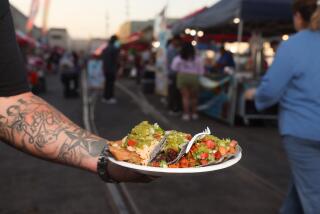Street Vendors Caught in Catch-22 : Business: The city’s first group of trainees remains subject to fines until legal selling districts are established.
PANORAMA CITY — For years, immigrant street vendors have been a ubiquitous though illegal part of street life, hawking steaming tamales and ice-cold helados from homemade carts with only occasional interference from authorities.
But 18 months ago, the city was faced with a decision to either step up enforcement or attempt to regulate sellers after health inspectors raised a furor with raids on vendors in the east San Fernando Valley. The Los Angeles City Council eventually approved a proposal to create eight special vending districts to accommodate the estimated 5,000 vendors working citywide, and approved a training program to help vendors obtain the proper health and business permits.
But as the first group of trainees completes the program, they still find themselves with no place to legally ply their trade.
“Technically, the carts are still illegal,” said Penny Young, director of the business and professional center at Mission College, where 27 vendors studied health codes, sanitation and food handling so they could pass government health exams. “They’re still getting ticketed. It’s awful, because there is this need for amnesty. We want them to be able to practice what they learned, but they can’t.”
Los Angeles officials say it could be months before the first legal vending district is established on Van Nuys Boulevard in Pacoima. Although vendors from that area--as well as those from the MacArthur Park area--have organized themselves, they face a lengthy, bureaucratic approval process before they can be established as legitimate merchants.
Until that happens, they face $130 tickets from Los Angeles police.
“It’s been going very slowly,” said Robert Valdez, sidewalk-vending administrator for the city’s Board of Public Works. “We’ve had problems with the state over where we can set up the zones, because some streets are under state jurisdiction.”
Also, Valdez said, the city is still required to hold public hearings, and the City Council must vote to establish the zones before they can become a reality.
“We’re very frustrated,” he said. “We’re out there trying to help the vendors find good locations, helping them get the signatures they need. But it’s hard. A lot of people are resistant to the idea.”
The frustration felt by Valdez is shared by some of the 27 vendors who graduated Thursday night from the culinary training program at Mission College.
“This is our livelihood,” said Ramon Cantero, 37, a Panorama City vendor. He estimates that on a good day, he can earn about $70 selling ice cream from his cart.
“Even though we finished the program, it looks like nothing is going to change,” Cantero said. “It will probably always be like this--we have to hide from the police. We need somebody to stick up for us.”
Young, of Mission College, took an interest in the vendors after the county health department raided the homes of vendors on Blythe Street, confiscating a truckload of their equipment. Young and Eloise Cantrell, Mission College dean of occupational education, received a grant last July from the city’s Industry and Commercial Development Department to train the vendors.
“They were in danger of losing their lives and their homes,” Young said. “We had the facilities--and the duty, as a community college--to help them out. Not only could we teach them basic food-handling skills, but we could help them with English and entrepreneurial training.”
Using the grant money, the college rented a closed Thai restaurant on Lanark Street in Panorama City to hold classes.
There, vendors learned sanitary methods of preparing, handling and storing foods.
Luis Negrete, 33, of Pacoima, a vendor of tamales, said he would sometimes leave meat sitting out to defrost for hours at a time. “Now I know, you let it defrost in the refrigerator,” said Negrete, whose brother and his mother-in-law also work as street vendors.
Negrete added that he once prepared foods in unwashed bowls. “Now, everything must be cleaned and stored, you see?” he said, pointing to dust that had settled atop a bowl.
Some vendors say they are proud of their training and eager to begin selling legally, without fear of police, who only sporadically enforce the laws that prohibit street vending.
Vendors also know that regulation comes at a price. The city will require them to purchase special carts at an average cost of $1,000. They will also be required to pay a city permit fee of $414, as well as tax-registration fees, liability insurance and other costs.
Yet despite the financial burden, many say they will benefit from the city’s legalization process, once it is finally in place.
“It’s better to pay everything than to hide,” said Luis Negrete’s brother Jorge. “Maybe we make less money the first year, but it will be better in the end.”
More to Read
Sign up for Essential California
The most important California stories and recommendations in your inbox every morning.
You may occasionally receive promotional content from the Los Angeles Times.










![[20060326 (LA/A20) -- STATING THE CASE: Marchers organized by unions, religious organizations and immigrants rights groups carry signs and chant in downtown L.A. "People are really upset that all the work they do, everything that they give to this nation, is ignored," said Angelica Salas of the Coalition of Humane Immigrant Rights. -- PHOTOGRAPHER: Photographs by Gina Ferazzi The Los Angeles Times] *** [Ferazzi, Gina -- - 109170.ME.0325.rights.12.GMF- Gina Ferazzi/Los Angeles Times - Thousands of protesters march to city hall in downtown Los Angeles Saturday, March 25, 2006. They are protesting against House-passed HR 4437, an anti-immigration bill that opponents say will criminalize millions of immigrant families and anyone who comes into contact with them.]](https://ca-times.brightspotcdn.com/dims4/default/34f403d/2147483647/strip/true/crop/1983x1322+109+0/resize/840x560!/quality/75/?url=https%3A%2F%2Fcalifornia-times-brightspot.s3.amazonaws.com%2Fzbk%2Fdamlat_images%2FLA%2FLA_PHOTO_ARCHIVE%2FSDOCS%2854%29%2Fkx3lslnc.JPG)